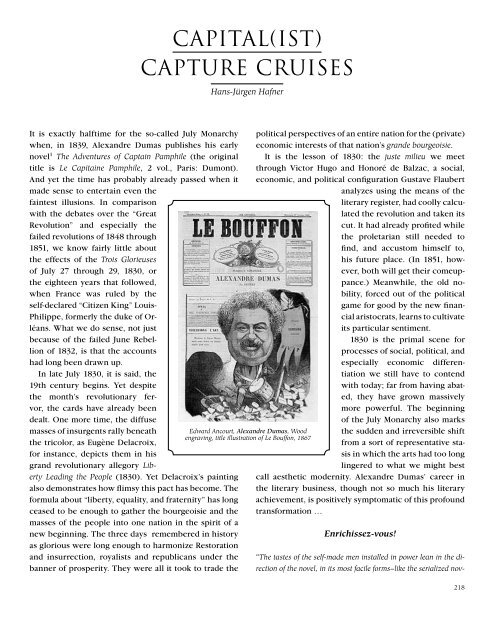EIN BILD ROMAN STÜCKEN A Pictorial Novel In Pieces - Captain ...
EIN BILD ROMAN STÜCKEN A Pictorial Novel In Pieces - Captain ...
EIN BILD ROMAN STÜCKEN A Pictorial Novel In Pieces - Captain ...
Sie wollen auch ein ePaper? Erhöhen Sie die Reichweite Ihrer Titel.
YUMPU macht aus Druck-PDFs automatisch weboptimierte ePaper, die Google liebt.
It is exactly halftime for the so-called July Monarchy<br />
when, in 1839, Alexandre Dumas publishes his early<br />
novel 1 The Adventures of <strong>Captain</strong> Pamphile (the original<br />
title is Le Capitaine Pamphile, 2 vol., Paris: Dumont).<br />
And yet the time has probably already passed when it<br />
made sense to entertain even the<br />
faintest illusions. <strong>In</strong> comparison<br />
with the debates over the “Great<br />
Revolution” and especially the<br />
failed revolutions of 1848 through<br />
1851, we know fairly little about<br />
the effects of the Trois Glorieuses<br />
of July 27 through 29, 1830, or<br />
the eighteen years that followed,<br />
when France was ruled by the<br />
self-declared “Citizen King” Louis-<br />
Philippe, formerly the duke of Orléans.<br />
What we do sense, not just<br />
because of the failed June Rebellion<br />
of 1832, is that the accounts<br />
had long been drawn up.<br />
<strong>In</strong> late July 1830, it is said, the<br />
19th century begins. Yet despite<br />
the month’s revolutionary fervor,<br />
the cards have already been<br />
dealt. One more time, the diffuse<br />
masses of insurgents rally beneath<br />
the tricolor, as Eugène Delacroix,<br />
for instance, depicts them in his<br />
grand revolutionary allegory Liberty<br />
Leading the People (1830). Yet Delacroix’s painting<br />
also demonstrates how flimsy this pact has become. The<br />
formula about “liberty, equality, and fraternity” has long<br />
ceased to be enough to gather the bourgeoisie and the<br />
masses of the people into one nation in the spirit of a<br />
new beginning. The three days remembered in history<br />
as glorious were long enough to harmonize Restoration<br />
and insurrection, royalists and republicans under the<br />
banner of prosperity. They were all it took to trade the<br />
Capital(ist)<br />
Capture Cruises<br />
Hans-Jürgen Hafner<br />
Edward Ancourt, Alexandre Dumas, Wood<br />
engraving, title illustration of Le Bouffon, 1867<br />
political perspectives of an entire nation for the (private)<br />
economic interests of that nation’s grande bourgeoisie.<br />
It is the lesson of 1830: the juste milieu we meet<br />
through Victor Hugo and Honoré de Balzac, a social,<br />
economic, and political configuration Gustave Flaubert<br />
analyzes using the means of the<br />
literary register, had coolly calculated<br />
the revolution and taken its<br />
cut. It had already profited while<br />
the proletarian still needed to<br />
find, and accustom himself to,<br />
his future place. (<strong>In</strong> 1851, however,<br />
both will get their comeuppance.)<br />
Meanwhile, the old nobility,<br />
forced out of the political<br />
game for good by the new financial<br />
aristocrats, learns to cultivate<br />
its particular sentiment.<br />
1830 is the primal scene for<br />
processes of social, political, and<br />
especially economic differentiation<br />
we still have to contend<br />
with today; far from having abated,<br />
they have grown massively<br />
more powerful. The beginning<br />
of the July Monarchy also marks<br />
the sudden and irreversible shift<br />
from a sort of representative stasis<br />
in which the arts had too long<br />
lingered to what we might best<br />
call aesthetic modernity. Alexandre Dumas’ career in<br />
the literary business, though not so much his literary<br />
achievement, is positively symptomatic of this profound<br />
transformation …<br />
Enrichissez-vous!<br />
“The tastes of the self-made men installed in power lean in the direction<br />
of the novel, in its most facile forms–like the serialized nov-<br />
218


